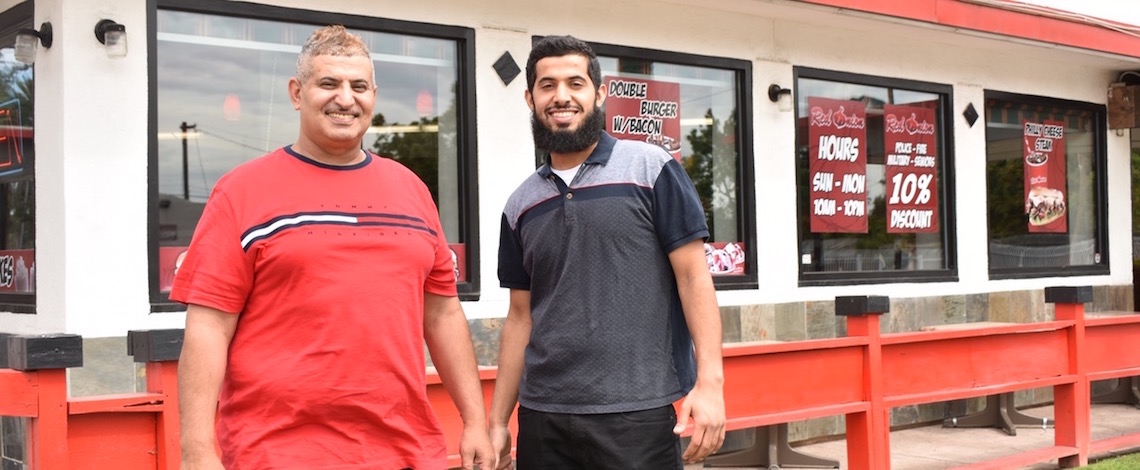
Owner Abdul Saleh and his son Khaled stand outside the Red Onion Restaurant. Photo by Frank Lopez
Written by Frank Lopez
It can be difficult to separate from reality the preconceptions one may have about a foreign nation. What many people know could revolve around the major headlines that make the news.
While the Arabian country of Yemen has a rich history, the catastrophic violence that has plagued it since 2014 when rebel forces took control of Yemen’s capital, Sanaa, has left it in utter destruction.
In the midst of such chaos, it is easy to overlook the unique stories of individuals.
For Abdul Saleh, owner of The Red Onion, a hamburger restaurant on Belmont Avenue in Fresno, his story is one that revolves around hard work and family. Even as a successful businessman, he still carries the grit that he’s had since he was a boy.
Roots in the Valley
Saleh’s father emigrated to the U.S. from Yemen in 1971, first settling in Bakersfield to work in the fields, leaving his wife and children to support them from abroad.
By 1982, Saleh’s father owned a small grocery store in Edison, California, and brought 11-year-old Saleh and his brother to the U.S.
In 1988, after living in Fresno for about six months, Saleh and his brother and father moved to New York City. Saleh had been working for someone else when his father bought half of a store, with Saleh eventually buying the other half.
Saleh said that by that time, there had been a large Yemeni community in New York, with many people migrating to the U.S. since even before his father did.
He said that though opening up a business always has a set of challenges, the generation of Saleh’s father helped pave the way for their children to one day operate in the business world.
“Our fathers’ generation made it easier for us,” Saleh said. “They opened up businesses, they had already worked hard on the farms, and they borrowed and owed a lot of money to a lot of people that they had to pay back. It was made for us. We only had to establish it, and get better and better and better.”
Throw away the key
About half a block down from their first store, in Manhattan’s Hell’s Kitchen area, and with loans from friends and family, Saleh and his father opened up a deli in 1991, which remains open to this day. Since day one it’s been open 24 hours a day, with the store key being thrown into the river right after it opened, Saleh quipped.
By that time, all of Saleh’s children were in New York, and he had an apartment across the street from the deli.
In 2004, he moved back to California to run a Shell gas station in Pixley, or as Saleh put it, to “take a vacation.” He took over a five-year lease, renewed another five-year lease and ran it until 2014.
Starting work at a young age and never attending high school, Saleh always enjoyed working in a kitchen.
In 2010, Saleh took over Bob’s Drive In Burgers and Shakes in Lindsay, which he still runs.
Saleh said most of the burger joints in the Central Valley are owned by people from Yemen. He said that having franchises such as Frosty Freeze, Frosty Queen, and Frosty King allows a business owner to work under the umbrella of a company and receive discounts from suppliers, but still be an independent owner.
A place to thrive
Even as the owner, Saleh loves to be in the kitchen and work with his staff — a spirit he gets from his own father, who at 76 still runs the store in New York and goes to work every day.
In the beginning of this year, Saleh took over the lease for Red Onion, making it the second burger joint he owns. Business has been good since he took over, and Red Onion has a 4.5-star rating on Yelp.
Saleh said he likes living in the Central Valley because it is better suited to raising a family, with more living space than the cramped cities in New York, especially with his 10 children.
One of Saleh’s sons, Khaled, is studying medicine in Arizona, but he comes back to work with his dad when he is out of school. Another one of his sons is an engineer, and also helps Saleh with the businesses in New York. Another one of his sons helps Saleh at Red Onion.
Saleh advises that anyone trying to start a business should know the field that they are wishing to enter.
“They’ve got to work for somebody first,” Saleh said. “You got to work at least two to three years to know what you’re doing, how to do it, and how to run the business.”
Generational sacrifice
Khaled said the sacrifices his father and other immigrants make for their children drives them to work harder for their own future and families.
Because the Central Valley has a diverse population, with many people from different countries and socio-economic backgrounds calling it home, it is safe to say that we will be seeing more individuals that have the work ethic of Saleh and family.
“What I see from immigrant students in my classes is that even though they aren’t the brightest — either because their parent’s didn’t read to them as children because they didn’t have the time, or some of them didn’t know how to read or write in English —those kids are the hardest workers,” Khaled said. “They have hard work ethics, and in the long run, that beats intelligence.”








